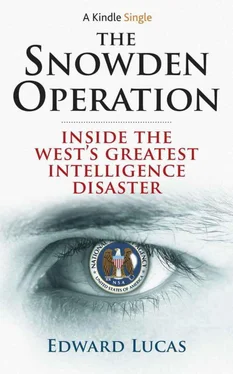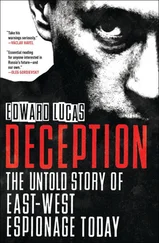These are big and important tussles. They will determine the shape of the world in coming decades. The overwhelming interest of the public in democratic, law-governed countries is that we come out on top. If we want to stay rich, safe and free, we need to win multiple battles with those who want us to be poor, vulnerable and constrained. Snowden has weakened our chances, and helped our enemies.
A further level of damage is to America’s commercial interests. Big US technology companies and service providers have to varying degrees collaborated with the NSA, either voluntarily or in response to judicial warrants. Sometimes these warrants were so secret that the companies were unable to tell their customers or shareholders even in outline what they had been forced to do. Any attempt to contest the rulings had to be in secret too. They were unable to respond truthfully to requests for comment from the media or elsewhere. So long as nothing leaked, this was perhaps a defensible tactic from the NSA’s point of view. If you have developed a secret and effective means of collecting electronic information, it is important that the target does not find out. Terrorists, criminals and enemy spies read English and use the internet. They will pick up clues about hardware and software which may have been compromised, and use alternatives.
Yet in retrospect, this approach taken by the NSA looks reckless. It depended on these arrangements staying completely secret. In June 2013, the Washington Post said that Microsoft, Google, Facebook, Apple, YouTube, Skype, AOL and Yahoo cooperated with the NSA’s PRISM programme. The companies said that they provided data only when legally obliged to do so. [53] http://www.washingtonpost.com/investigations/us-intelligence-mining-data-from-nine-us-internet-companies-in-broad-secret-program/2013/06/06/3a0c0da8-cebf-11e2-8845-d970ccb04497_story.html?hpid=z1 ; http://techcrunch.com/2013/06/06/google-facebook-apple-deny-participation-in-nsa-prism-program . Dropbox was also reportedly involved, but denied any knowledge: Larry Page and David Drummond, ‘Official Google Blog’, June 7, 2013, http://googleblog.blogspot.de/2013/06/what.html
It is worth noting that the initial coverage of PRISM was accompanied by some serious inaccuracies and misrepresentations. [54] http://www.zdnet.com/the-real-story-in-the-nsa-scandal-is-the-collapse-of-journalism-7000016570 ; http://news.cnet.com/8301-13578_3-57588337-38/no-evidence-of-nsas-direct-access-to-tech-companies
It does not give the NSA the claimed ‘direct access’ to these companies’ servers. It is a way of transferring data collected under a court order. The Washington Post also backed away from its initial claim that the companies concerned ‘participate knowingly’.
Nonetheless, the business models and brands of these companies are dented. They are furious with the administration, both for what they were made to do, and because it has been made public. Microsoft, for example, has issued a statement decrying the interception of customer data on its networks as an ‘advanced persistent threat’—the term normally used for Chinese and other cyber attacks. [55] https://blogs.technet.com/b/microsoft_blog/archive/2013/12/04/protecting-customer-data-from-government-snooping.aspx
Microsoft says it will expand the use of encryption, challenge gag orders in court and make its software more transparent (to allay fears that it may contain accidental or deliberate flaws which enable snooping).
But the distorted lens through which the Snowden cheerleaders view the world magnifies failings close to home, and obscures those abroad. The shortcomings of the West become its defining characteristics. Greenwald, with his extensive experience as a trial lawyer specialising in corporate wrongdoing, provides a caustic if glib account of America’s misdeeds. He cites the Bush administration’s foreign policy, the rendition (kidnapping) and torture of terrorist suspects, past incidents of warrantless wiretapping, and much more besides. These are real problems and should indeed provoke soul-searching among those who wish the West to occupy the moral high ground, and for democracies to maintain their political and economic pre-eminence. But they are no excuse for nihilism.
As the journalist Brendan O’Neill points out: [56] http://blogs.telegraph.co.uk/news/brendanoneill2/100252627/whats-the-difference-between-a-whistleblower-and-a-mad-conspiracy-theorist
Conspiracy theorising and the cult of the whistle-blower have the same origins: a crisis of democracy, the collapse of public engagement, and a dearth of faith in politicians and even in politics itself. The more that some people feel alienated from politics, cut off from the old to-and-fro of political debate, the more they can feel tempted to embrace hare-brained stories about tiny cliques of rich folk or lizards or Jews running everything behind our backs. Conspiracy theories feed off the carcass of democratic engagement. And so it is with whistle-blowing, too: the more that radicals lose faith in both the political system, which they view as totally corrupt, and the little people, who are ‘wilfully ignorant’, the more they come to believe that only brave, truth-wielding individuals can save the world from enslavement by a dastardly elite.
The Snowdenistas’ extremism and hyperbole reflect a mind-set which the blogger Catherine A Fitzpatrick has outlined well in her essay ‘When Thinking Styles Collide’. [57] ‘When Thinking Styles Collide: Silicon Valley, Congress and C.P. Snow’s Two Cultures’, http://3dblogger.typepad.com/wired_state/2012/06/when-thinking-styles-collide-silicon-valley-congress-and-cp-snows-two-cultures.html . See also the follow-up post ‘Who can be trusted’, http://3dblogger.typepad.com/wired_state/2013/12/who-can-be-trusted-on-nsa-and-encryption.html
She was actually writing about the geek world’s attitude to anti-piracy legislation, but the points she makes also highlight the weakness of other self-described crusaders for digital freedom, who scorn the law-making process, and judicial and parliamentary oversight, as out-of-date or irrelevant in the digital age. Geeks, she says, do not ‘get’ governance.
• They don’t understand how a bill becomes a law and don’t believe in the process;
• They don’t understand how cases get prosecuted and how evidence has to be presented and [how] the different parts of the judicial system operate… checks and balances;
• They don’t get how judicial review works to determine constitutionality.
The problem, she argues, is that tech-savvy people tend to look at laws as if they are computer code. In the software world, even a tiny flaw negates a hugely strong premise. Once a bad law is on the books, they believe, it will operate like bad software: mechanically, like a guillotine. So: ‘unless every single edge-case, hypothetical, problem is identified, spelled out, and remedied, nothing can stand.’
That is not the way that a modern law-governed society works. Imperfections and hard cases abound. The art of politics and administration is balancing constraints and anomalies in a way that produces the least unfair or dangerous outcomes, now and in the future. That world is messy and sometimes murky. To the self-righteous and impatient it may seem impossible to change. But for all its faults, it is capable of correction. America recovered from the McCarthy era. The Church committee reined in an out-of-control FBI after the abuses discovered in the 1970s. The same is true in other Western countries.
Zealots such as Snowden prefer their own judgment to the outcomes that this flawed, slow, muddled system provides. It is their right to believe this and to act on it—within the law. But their form of protest takes the form of stealing and publishing state secrets, in a way that causes irreversible damage (impact, as they would put it). This is not an approach that would be tolerated in other forms of protest. Anti-nuclear activists may blockade power stations or weapons facilities. Even they would regard it as irresponsible to try to sabotage them, aiming to cause maximum damage, in the expectation that the resulting debate will outweigh the harm done.
Читать дальше












